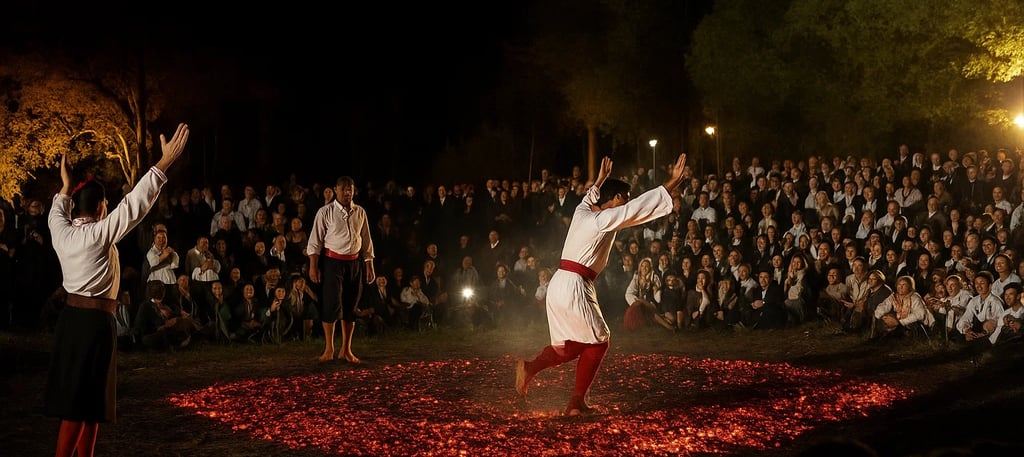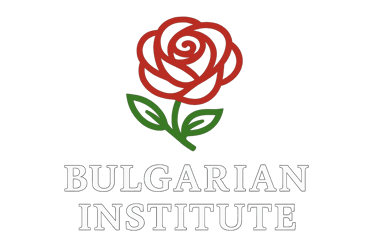
COMPLETE BULGARIAN COURSE
SATISFY YOUR THIRST FOR KNOWLEDGE
THE BULGARIAN LANGUAGE: GATEWAY TO YOUR FUTURE
Bulgarian, known as "Bǎlgarski" in its native form, is a language that holds a unique place in Europe’s linguistic landscape. It belongs to the South Slavic branch of the Slavic language family, which also includes Serbian, Croatian, Macedonian, Slovene, and others. Bulgarian is the official language of Bulgaria and is also spoken by communities in neighboring countries such as Greece, Romania, Serbia, North Macedonia, and Turkey, as well as by significant diaspora populations in Western Europe and North America. With around 8 million speakers, it is one of the most historically and culturally influential Slavic languages.
What makes Bulgarian particularly fascinating is that, while it shares deep roots with other Slavic languages, it has developed distinct grammatical features that set it apart. Unlike most other Slavic languages, Bulgarian has no case system for nouns, instead using prepositions and word order to express grammatical relationships. It also features a definite article, which is attached to the end of the word (for example, stol table → stolǎt the table), and a complex verb system with multiple tenses and aspects.
Moreover, Bulgarian was one of the first Slavic languages to be written in the Cyrillic alphabet, a script that originated in the medieval Bulgarian Empire and later spread across Eastern Europe and Eurasia. This historical contribution has had a lasting cultural and religious impact, shaping the identity of the Slavic Orthodox world.
Although closely related to Macedonian and sharing similarities with Serbian, Bulgarian remains distinct and mutually intelligible primarily with Macedonian. Its rich history, melodic rhythm, and expressive vocabulary make it both challenging and deeply rewarding for learners who wish to explore the cultural and linguistic heritage of the Balkans.

Bulgarian is a difficult language to learn. It’s distinctive features can be found in its Vocabulary, Grammar and Pronunciation, which have evolved independently while incorporating influences from Turkish, German, Slavic, and Latin over centuries. The challenge with many learning methods is that they only take you part of the way. Mobile apps are fun and motivating, but they often stay on the surface, giving you basic vocabulary without real depth in grammar or conversation. Live courses offer great interaction with teachers but can be inflexible and expensive, making them difficult to sustain long term. University programs are academically rigorous, but they demand years of commitment and come with high living and tuition costs. Textbooks provide structure and clarity, but they lack immersion and often don't provide the practical information that learners actually need.
If you are serious about learning Bulgarian, commit to a method that makes you actually speak the language. With the right system, you can go beyond memorised phrases and truly speak, read, and think in Bulgarian. The journey is demanding, but the rewards — access to Bulgarian news, cinema, music, history, personal connections and work opportunities — are immense. The time to start is now, with our Complete Bulgarian Master Course that has been designed to give you nothing less than complete fluency.


NATURAL METHOD TO LEARN BULGARIAN
Our language course is based on the Natural Method, also known as the Natural Approach, developed by linguist Stephen Krashen and language educator Tracy Terrell. This approach focuses on creating an environment that mimics how individuals naturally acquire their first language, emphasizing comprehension, communication, and a stress-free learning experience.
While other language courses rely on rote memorization and drills, a heavy academic approach to grammar, repetitive exercises, expensive and time-consuming formal tutoring sessions or ineffective and shallow phone apps, we will have you gradually build your language skills like a child learning his/her mother tongue.
There are essentially 5 Core Principles in the Natural Method:
Comprehensible Input (i+1)
Learners acquire a language when they are exposed to materials slightly beyond their current level of understanding (represented as i+1). By hearing or reading content they mostly understand, learners can gradually internalize new vocabulary and grammar structures.Focus on Communication
The Natural Method prioritizes fluency and the ability to communicate over grammatical perfection. Errors are seen as a natural part of the learning process and are not heavily penalised, reducing anxiety and encouraging learners to express themselves.Emotional Element
Emotional factors like anxiety, motivation and enjoyment greatly influence language acquisition. When learners are in a relaxed state, achieved by removing the anxiety linked to the pressure to produce perfect grammar, it is easier for them to get through the initial phase which is arguably the hardest and where most give up. It is also proven to be easier for the brain to absorb and retain new information if the learner is actually interested in the language and its underlying culture, which is why he have included extensive cultural insights, historical and modern pop culture elements in our language course.Stages of Language Acquisition
Scholars have identified the following stages in the language acquisition process of young children:Pre-production: The "silent period," where learners focus on listening and understanding without speaking.
Early Production: Learners begin using simple words and phrases.
Speech Emergence: Learners can construct longer sentences and express ideas more freely.
Intermediate Fluency: Learners develop more complex language skills and can engage in meaningful conversations.
Advanced Fluency: Learners achieve near-native proficiency.
The goal of our courses is thus to mimic the natural language acquisition process without overwhelming the learner with long and tedious lessons but ensuring gradual gains so that he/she remains committed to his/her fluency goal.
Meaningful Interaction
Instead of rote memorization of single words and grammar rules over and over, the Natural Method encourages activities that involve real-world communication to help retain information. This is why we have included storytelling and role-playing scenarios that simulate everyday situations, with exercises that allow the learner to understand his/her current level and thus improve upon specific elements.


EXPAND YOUR KNOWLEDGE
If you are serious about learning Bulgarian, we recommend that you download the Complete Bulgarian Master Course.
You will receive all the information available on the website in a convenient portable digital format as well as additional contents: over 15.000 Vocabulary Words and Useful Phrases, in-depth explanations and exercises for all Grammar Rules, exclusive articles with Cultural Insights that you won't in any other textbook so you can amaze your Bulgarian friends or business partners thanks to your knowledge of their country and history.
With a one-time purchase you will also get hours of Podcasts to Practice your Bulgarian listening skills as well as Dialogues with Exercises to achieve your own Master Certificate.
Start speaking Bulgarian today!
FREQUENTLY ASKED QUESTIONS
Top 5 Reasons to Learn Bulgarian:
It’s Unique and Fascinating—Join a Global Niche Community
Bulgarian is spoken by over 7 million people in Bulgaria and by Bulgarian communities in countries like Turkey, Greece, Germany, Spain, the UK, the US, and Canada. As one of the oldest Slavic languages and the first to be written in Cyrillic, Bulgarian offers a distinct linguistic experience. Its melodic sound, rich history, and complex structure make it an intriguing language to study—and connect you with a global community of heritage speakers, cultural enthusiasts, and curious learners.
Gain a Deeper Understanding of Balkan History, Folklore, and Culture
Learning Bulgarian opens the door to the rich cultural tapestry of the Balkans. From the legacy of the Thracians and the First Bulgarian Empire to the literary revival of the 19th century and the dynamic cultural scene today, Bulgaria has played a crucial role in Southeastern European history. Knowing the language gives you access to centuries of literature, epic songs, medieval manuscripts, Orthodox church traditions, and contemporary film and music—offering insight into a region that is often overlooked but endlessly rewarding.
Bulgarians Genuinely Appreciate Language Learners
Bulgarians are known for their hospitality and pride in their culture, and they deeply appreciate when foreigners make an effort to speak their language. Even a simple “Dobro utro” (Good morning) or “Blagodarya” (Thank you) can spark warm smiles, friendly exchanges, and a deeper level of respect. Speaking Bulgarian while traveling or living in the country shows genuine interest and helps you connect with people, understand social customs, and discover hidden gems through local conversations.
Visit Bulgaria for a Rich and Authentic Travel Experience
Bulgaria is a land of contrasts—Black Sea beaches, snow-capped mountains, medieval monasteries, ancient ruins, and vibrant cities like Sofia and Plovdiv. Whether you're hiking in the Rhodopes, tasting banitsa in a village bakery, or soaking in the mineral springs of Velingrad, knowing Bulgarian transforms your experience from surface-level tourism to meaningful engagement. It helps you read menus, signs, and legends, interact with locals, and navigate the country with ease and authenticity.
Career and Academic Opportunities in an Emerging EU Market
As a member of the European Union with growing ties in trade, IT, tourism, and education, Bulgaria offers professional and academic opportunities for those who speak the language. Bulgarian is especially valuable for work in diplomacy, international development, linguistics, ethnography, archaeology, and Eastern European studies. It also gives you an edge when collaborating with Balkan partners or engaging with multilingual populations across the region. In a world that values unique skills and regional expertise, Bulgarian can set you apart.


Why learn Bulgarian?
How difficult is Bulgarian?
The Foreign Service Institute (FSI) of the United States Department of State classifies Bulgarian as a Category IV language, meaning it is considered more challenging for native English speakers to learn compared to Romance or Germanic languages. This is largely due to differences in grammar structure, vocabulary, and the Cyrillic alphabet. However, Bulgarian also offers unique advantages that make it a fascinating and rewarding language for dedicated learners.
While Bulgarian presents specific challenges, it also follows relatively consistent rules and provides a rich linguistic and cultural experience for those who commit to studying it.
Shared Vocabulary and Slavic Roots
Unlike Italian, French, or Spanish, Bulgarian doesn’t share Latin roots with English. However, learners will notice familiar internationalisms and loanwords, especially in fields like technology, science, and culture.
For example:
телевизия (televiziya) – television
музика (muzika) – music
компютър (kompyutăr) – computer
That said, most core vocabulary in Bulgarian is Slavic in origin, which can be less intuitive for English speakers. Still, many learners enjoy discovering patterns and developing a feel for the language through repeated exposure and context.
Complex Grammar with a Unique Definite Article System
One of the most distinctive features of Bulgarian grammar is the postfixed definite article—unlike most languages, the article is attached to the end of the noun.
For example:
ученик – student
ученикът – the student
Bulgarian has no grammatical cases (unlike Russian or Polish), which makes sentence structure more accessible. However, learners must adapt to other concepts like gender (masculine, feminine, neuter), number, and verb aspect (perfective vs. imperfective), which are central to Slavic grammar.
Verb Aspects and Conjugations
Bulgarian verbs are conjugated for tense, person, and mood, and learners must also understand verb aspect—the distinction between completed and ongoing actions.
For example:
пиша – I write / I am writing (imperfective)
написах – I wrote (perfective)
The tense system is one of the richest in the Slavic family, including forms such as present, past, future, past perfect, and even renarrative (used to indicate reported or secondhand information). While this may sound daunting, the system is logical and becomes intuitive with regular practice.
Cyrillic Alphabet and Clear Pronunciation
Bulgarian uses the Cyrillic alphabet, which can be learned relatively quickly due to its phonetic nature. Each letter typically corresponds to a single sound, and words are generally pronounced as written.
For example:
мама – mama (mother)
река – reka (river)
библиотека – biblioteka (library)
Pronunciation is clear and consistent, with stress placement being the only unpredictable aspect. There are no nasal vowels or tones, and Bulgarian has no articles before nouns, which simplifies reading once the alphabet is mastered.
Flexible but Structured Word Order
Bulgarian generally follows a subject-verb-object (SVO) word order, similar to English. However, due to verb conjugation and context, word order is often flexible, especially in spoken Bulgarian, to emphasize certain parts of the sentence.
For example:
Аз ям ябълка. – I eat an apple.
Ябълка ям аз. – It’s an apple that I eat. (emphasis on the object)
Because of its clarity in verb endings and subject markers, Bulgarian allows movement of sentence elements for focus or stylistic effect without creating confusion.
Our Bulgarian Language Course
Our Bulgarian language course is designed to help you speak, understand, and think in Bulgarian with confidence. It gradually introduces you to the Cyrillic script, grammar structures, and vocabulary while focusing on real-life conversation, cultural insights, and practical usage.
While aspects like verb conjugation and aspect may be new at first, our step-by-step method makes learning natural and intuitive. Whether you’re planning a trip to Sofia, reconnecting with your heritage, or studying the Balkans, our course will guide you toward fluency with clarity and encouragement.
With consistent practice, immersive content, and expert instruction, you’ll be surprised how quickly Bulgarian becomes part of your daily life and thinking.


One of the biggest obstacles to learning Bulgarian isn’t necessarily the grammar—it’s navigating the overwhelming range of learning resources and finding materials that effectively bridge the gap between beginner and advanced content. Many learners find themselves stuck after reaching an intermediate level because so much of the available content either targets complete beginners or native speakers, leaving a gap in truly level-appropriate resources.
Unlike languages such as Spanish or French, where graded readers, simplified literature, and audiovisual materials are abundant, Bulgarian content is often limited and inconsistent in quality. Learners may feel caught between dry textbook exercises and native-level texts that are too advanced or culturally dense. While Bulgarian media—films, folklore, contemporary novels, podcasts, and pop music—reflects a rich and diverse cultural landscape, much of it is not designed with learners in mind and can be challenging to approach without guidance.
This challenge is further complicated by the fact that Bulgarian, though standardized in official usage, is spoken with a variety of regional accents and speech patterns. From Sofia to Varna, from Plovdiv to the Rhodope villages, pronunciation, vocabulary, and even grammar can shift in subtle ways. While this diversity adds depth and authenticity to the language, it can be confusing for learners trying to understand native speakers across different contexts or media. Moreover, much Bulgarian content—especially in literature and public discourse—presumes a degree of cultural, historical, or political knowledge that learners may not yet have.
We recognize that finding high-quality Bulgarian learning resources can be a challenge, and our goal is to bridge this gap by creating content that helps learners progress confidently beyond the beginner level. Our platform is dedicated to offering practical lessons, cultural insights, and engaging materials that support step-by-step advancement toward fluency. We focus on real-life usage, interactive learning, and gradual skill-building, so you won’t feel lost once you move past basic vocabulary and grammar.
If you have any suggestions for future lessons or articles, feel free to send them to pr@bulgarianinstitute.com—we’d love to hear from you and tailor our content to fit your learning needs!


Why can't I improve in Bulgarian?
Is Bulgarian similar to other languages?
Bulgarian belongs to the South Slavic branch of the Indo-European language family, making it closely related to languages such as Serbian, Croatian, Slovene, and Macedonian. It also shares deeper linguistic roots with East Slavic languages like Russian and Ukrainian, as well as West Slavic ones such as Polish and Czech. Among the Slavic languages, Bulgarian is unique for its early abandonment of the case system (except in pronouns), its use of the definite article as a suffix, and its complex tense system—features that set it apart even within its own family.
Bulgarian is spoken primarily in Bulgaria, where it is the official language, and it is also recognized as a minority language in Serbia, Romania, Moldova, Ukraine, Albania, and Hungary. Significant Bulgarian-speaking communities exist in Turkey, Greece, Germany, Spain, the United Kingdom, the United States, Canada, and Australia, forming a global diaspora of heritage speakers.
Over the centuries, Bulgarian has borrowed extensively from other languages due to historical conquests, trade, religious influence, and cultural contact. These borrowings have enriched the language while preserving its distinct Slavic core. Key sources of linguistic influence include:
Old Church Slavonic and Medieval Greek
As the liturgical and literary language of medieval Bulgaria, Old Church Slavonic, based on the local Slavic dialects of the region, was codified by Saints Cyril and Methodius. Greek was also influential due to the religious and administrative authority of the Byzantine Empire.
ангел (angel) – from Greek angelos
епископ (bishop) – from Greek episkopos
граматика (grammar) – from Greek grammatike
Turkish Influence
During nearly five centuries of Ottoman rule, Ottoman Turkish left a profound imprint on Bulgarian, particularly in areas such as food, administration, daily life, and clothing. Many of these words are still in active use today.
чорап (sock) – from Turkish çorap
чешма (fountain) – from Turkish çeşme
кибрит (match) – from Turkish kibrit
Russian and Church Slavonic Influence
In the 19th century, with the rise of Bulgarian nationalism and the influence of Russian Orthodoxy, many Russianisms entered Bulgarian, especially in formal, religious, and academic contexts.
възможност (possibility) – influenced by Russian vozmozhnost
училище (school) – shared Slavic root but reinforced through Church Slavonic
православие (Orthodoxy) – from Russian/Church Slavonic sources
French and German Influence
In the 19th and early 20th centuries, French was the language of diplomacy and high culture, and German was important in science and education. Both languages contributed to Bulgarian vocabulary, especially in politics, military, fashion, and science.
гардероб (wardrobe) – from French garde-robe
инженер (engineer) – from German Ingenieur
файл (file) – from German Feile or French fichier
English Influence
Since the late 20th century, English has become the dominant source of modern loanwords in Bulgarian, particularly in technology, business, entertainment, and pop culture. These words often enter Bulgarian unaltered or slightly adapted to the phonological system.
компютър (computer) – from English computer
маркетинг (marketing) – direct borrowing
интернет (internet) – direct borrowing
филм (film) – adapted pronunciation


These are 5 proven methods that we have developed as language learners (not only as teachers!) that will help you achieve complete mastery of the Bulgarian language:
1. Immerse Yourself Completely
Surround Yourself: Change the language of your phone, computer, tv, console, news sources, radio stations, song playlists and streaming apps to the language you want to learn.
Engaging Content: Listen to native music, watch original movies, learn about the culture and history of the country on Youtube. This will help you stay motivated and reduce the initial frustration.
Make Mistakes: Travel to the country where the language is spoken and don't be afraid to engage with the locals. People will be amazed at your efforts to learn their language.
2. Focus on the Most Useful Words and Phrases
Study Efficiency: Learn the top 2,000 words in the language, as they often cover 80-90% of everyday conversations. Learning takes time but that doesn't mean it has to take very long to see results.
Real Conversations: Start by practising with common phrases you'll actually use in real-life situations, like greetings, ordering food, asking for directions, etc.
3. Use Memorization Techniques
Spaced Repetition: Our Courses are based on spaced spaced repetition systems (SRS) to help you memorize words and grammar in the long term and with miminal effort by showing them to you in progression.
Mnemonic Devices: trick your brain and speed up the learning process by trying to think of an example or "story" for each new word / expression you struggle to remember.
4. Learn the Language based on the Context
Practice Makes Perfect: Remember that your grammar doesn't have to be perfect as long as you can be understood! There is no shame in using simple phrases to get you point across.
Shadowing Technique: Repeat in your head after native speakers in real-time while listening or watching videos with original subtitles to improve your comprehension.
5. Consistency is Everything
Daily Practice: Even just 30 minutes a day is more effective than sporadic, long day study sessions. Take breaks often when reading and always have fun to increase productivity.
Compound Results: Small, achievable goals like reading 5 pages daily, or even just watching a movie or playing a videogame every evening produce results over time if you don't see them immediately.


How to become fluent in Bulgarian?
How many people speak Bulgarian?
Native Speakers: Over 7 Million
Bulgarian is the official language of the Republic of Bulgaria and one of the major South Slavic languages. According to recent estimates, approximately 7 to 8 million people speak Bulgarian as their first language, with the majority residing in:
Bulgaria (home to over 6.5 million native speakers)
Turkey (significant Bulgarian-speaking minority, especially among ethnic Bulgarians and Pomaks)
Serbia (particularly in the region of Bosilegrad and Dimitrovgrad)
North Macedonia (where a portion of the population uses Bulgarian at home or understands it)
Ukraine and Moldova (especially in Bessarabia, where historical Bulgarian communities remain)
In Bulgaria itself, nearly the entire population speaks Bulgarian natively or fluently, making it a highly homogeneous linguistic landscape. The language is also recognized as a minority language in some neighboring countries.
Second-Language Speakers: 1–2 Million More
Bulgarian is also spoken as a second language by a growing number of people, especially in contexts of regional communication, migration, and academic study.
It is commonly studied or spoken in:
North Macedonia and Serbia, where historical and linguistic ties to Bulgarian remain strong
Ukraine and Moldova, especially in Bulgarian minority schools
Greece and Romania, among Bulgarian diaspora communities
Western Europe (Germany, Spain, the UK, and the Netherlands), due to labor migration and growing Bulgarian communities
Russia and the former Soviet Union, where Bulgarian is sometimes learned in Slavic linguistic departments
Additionally, Bulgarian is studied by linguists, Slavists, and Balkanologists in academic institutions across Europe and North America.
Global Diaspora: Over 2 Million People of Bulgarian Descent
The Bulgarian diaspora consists of an estimated 2 to 3 million people living outside of Bulgaria, many of whom maintain varying degrees of language proficiency. Bulgarian communities are especially prominent in:
Germany, Spain, the United Kingdom, and Italy (major destinations for labor migration since the early 2000s)
Canada and the United States, where Bulgarian heritage communities maintain language schools and cultural associations
Turkey, home to a longstanding population of Bulgarian Turks and Bulgarian-speaking Pomaks
Ukraine, Moldova, and Kazakhstan, where ethnic Bulgarian settlements date back to the 19th century
In many of these communities, the Bulgarian language is still spoken at home, preserved through community efforts, weekend schools, churches, and Bulgarian-language media outlets.
A Global Total: Around 9–10 Million
When combining all groups, the estimated global number of Bulgarian speakers is as follows:
Native speakers: ~7 million
Second-language speakers: ~1–2 million
Heritage and diaspora speakers: ~1 million or more
This brings the estimated global total of Bulgarian speakers to approximately 9 to 10 million.
Though Bulgarian is not among the world’s most widely spoken languages by number, it holds deep historical and cultural significance. As the first Slavic language to be codified in writing (via Old Church Slavonic), and as a bridge to understanding the Balkan linguistic and cultural landscape, Bulgarian occupies a unique place in the European linguistic map. It is also one of the official languages of the European Union, contributing to political, academic, and cultural dialogue across the continent.




EXPAND YOUR KNOWLEDGE
If you are serious about learning Bulgarian, we recommend that you download the Complete Bulgarian Master Course.
You will receive all the information available on the website in a convenient portable digital format as well as additional contents: over 15.000 Vocabulary Words and Useful Phrases, in-depth explanations and exercises for all Grammar Rules, exclusive articles with Cultural Insights that you won't in any other textbook so you can amaze your Bulgarian friends or business partners thanks to your knowledge of their country and history.
With a one-time purchase you will also get hours of Podcasts to Practice your Bulgarian listening skills as well as Dialogues with Exercises to achieve your own Master Certificate.
Start speaking Bulgarian today!






